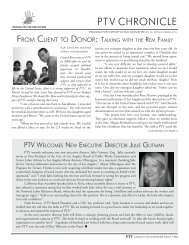Interview with Dr. Jose Quiroga, Page 19 - Program for Torture Victims
Interview with Dr. Jose Quiroga, Page 19 - Program for Torture Victims
Interview with Dr. Jose Quiroga, Page 19 - Program for Torture Victims
Create successful ePaper yourself
Turn your PDF publications into a flip-book with our unique Google optimized e-Paper software.
of expensive military campaigns in Afghanistan and<br />
Iraq; the fact that the UK and France tied up resources<br />
in Libya, and the absence of a clear road-map to<br />
facilitate EU and US engagement. The US Congress<br />
is still to approve $1.3 billion in military aid to Egypt.<br />
“The risks are clear,” the report says, “Unless the<br />
drivers of change in each country are strategically engaged<br />
and a region-wide support program conceived,<br />
the outcome of the uprising will be unknown and<br />
could potentially be regressive.”<br />
Yet the opportunity <strong>for</strong> a positive outcome<br />
has never been clearer. Experts on the region<br />
say that while aid is urgently needed, it must be<br />
accompanied by real economic re<strong>for</strong>ms that succeed<br />
in trans<strong>for</strong>ming the economies and address the<br />
longstanding development challenges facing<br />
the region.<br />
Ox<strong>for</strong>d University’s Adeel Malik and <strong>for</strong>mer<br />
Jordanian Finance Minister Bassim Awadallah<br />
wrote in their paper The Economics of the Arab Spring<br />
“During the next decade an estimated 100 million<br />
jobs need to be created in the Middle East. The public<br />
sector, already bloated and insufficient, is unprepared<br />
to meet this employment challenge.”<br />
Both authors say that economic diversification<br />
is the key to economic development. “Without<br />
developing a robust private sector and <strong>with</strong>out reducing<br />
the region’s dependence on natural resources,<br />
the gains that the Arab world has made in literacy<br />
and health cannot be translated into lasting economic<br />
prosperity.”<br />
According to the authors, the region (the Middle<br />
East and North Africa) is the largest spender on<br />
defence (as a share of GDP). They blame economic<br />
fragmentation, the absence of a large connected<br />
market and excessive dependence on natural<br />
resources as the major contributing factors <strong>for</strong> the<br />
lack of economic development.<br />
According to them what is needed is an infrastructure<br />
that connects regional economies; decentralised<br />
control of the economies; and above<br />
all, the eradication of arbitrary regulations that inhibit<br />
the movement of goods and labour across borders.<br />
All of these challenges, they write, need a regional<br />
approach.<br />
There is no doubt that a paradigm shift and<br />
a new vision will be needed to achieve the type of<br />
regional economic integration that they recommend.<br />
A woman holding an<br />
wounded relative during<br />
the Yemen uprising.<br />
PHOTO: SAMUEL ARANDA/CORBIS/<br />
NEW YORK TIMES (2012 WORLD<br />
PRESS PHOTO OF THE YEAR)<br />
Suggestions have been made by the <strong>for</strong>mer Egyptian<br />
<strong>for</strong>eign minister and Arab League secretary general<br />
Amr Moussa that there is a need <strong>for</strong> a type of<br />
Marshall Plan <strong>with</strong> immediate impact to tackle the<br />
region’s challenges.<br />
Since neither the US nor Europe can af<strong>for</strong>d<br />
the massive aid flows that would underpin a Marshall<br />
Plan’s success, it has been suggested that the<br />
oil-rich Arab Gulf, together <strong>with</strong> powerful emerging<br />
economies such as China, India, Brazil<br />
and Turkey would need to shoulder much of<br />
the burden.<br />
“The Marshall Plan [implemented after WWII]<br />
was not simply money,” said Mona Yacoubian from<br />
the US Institute of Peace. “It was its vision <strong>for</strong><br />
a new prosperous Europe built on innovation and<br />
partnership, collective problem solving, innovative<br />
ideas, and an integrated approach that recognised<br />
the interplay of politics, economic and security<br />
<strong>with</strong> a particular focus on building regional economic<br />
integration.”<br />
Yacoubian said that a Marshall Plan-inspired<br />
strategy <strong>for</strong> the Arab world would seek to lay the<br />
foundations <strong>for</strong> successful political and economic<br />
transitions. It would build strong partnerships between<br />
the UN, European Union, Gulf and emerging<br />
economics and the Arab world.<br />
“A holistic approach that focuses on political<br />
change, economic growth and regional security<br />
would begin to redress the region’s pressing problems,”<br />
She said.<br />
While the final chapters of the Arab Spring<br />
are yet to be written, it has certainly presented<br />
a historical opportunity <strong>for</strong> the Arab world to turn<br />
stunted states into peaceful and prosperous nations<br />
and the chance to realise its vast potential.<br />
It is now the right time <strong>for</strong> the international<br />
community to respond <strong>with</strong> a region-wide assistance<br />
program led by Arab states, so that the Arab<br />
Spring can flourish. Otherwise, the Arab world<br />
could miss this unique opportunity. Un<strong>for</strong>tunately,<br />
history is filled <strong>with</strong> missed opportunities.<br />
16<br />
REFUGEE TRANSITIONS • ISSUE 26 THE ARAB SPRING: ONE YEAR ON 17




